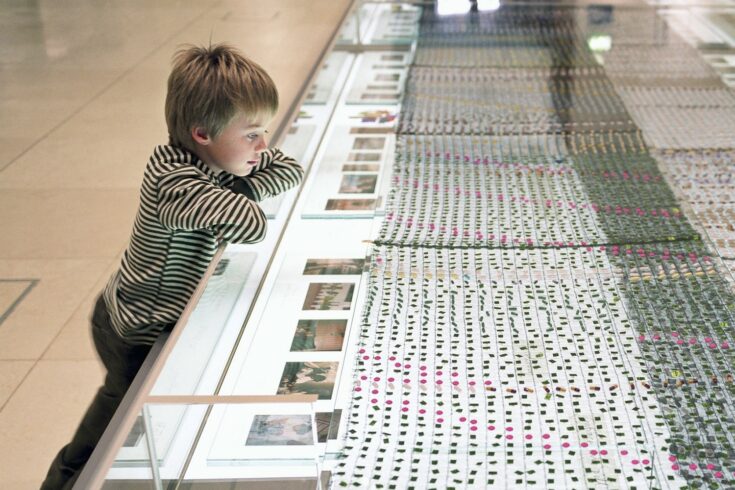A new exhibition at the Glasgow Science Centre presents creative ideas about how museums and galleries might address the challenges of the climate emergency.
Running from 25 June, ‘Reimagining Museums for Climate Action’ explores how museums can help society make the deep, transformative changes needed to achieve a net-zero world, as well as addressing their own carbon footprints.
Funded by the Arts and Humanities Research Council (AHRC), the exhibition will remain in place until November, coinciding with COP26, the United Nations Climate Change Conference.
The exhibition is integrated within the Powering the Future display at the Science Centre to highlight the crucial role that people, ideas and cultural institutions have to play in shaping the world of tomorrow.
Museums driving meaningful change
The exhibition presents a range of proposals for how museums could support meaningful climate action.
It features a range of new ideas about:
- the things museums collect
- the stories they tell
- the materials they are built of, and
- the ways they support and work with communities.
Some of these ideas are speculative, even fantastical, while others are already being implemented.
A design and ideas competition
This exciting initiative began life as a design and ideas competition, launched on 18 May 2020 for International Museum Day.
Over 250 submissions were received from 48 countries, with proposals from:
- architects
- designers
- activists
- artists
- student groups
- academics
- indigenous communities
- those already working in museums globally.
The eight successful teams were then invited to develop their ideas for the exhibition at Glasgow Science Centre.

Stuart Wallace for Glasgow Science Centre
There have been proposals from Brazil, Indonesia, Singapore, the United States and the UK. The global scope of the proposals shows that museums have an important role to play in addressing climate change at an international level, tailored to their local context.
Catalysts for climate action
Emma Woodham, climate change programme manager at Glasgow Science Centre, said:
The exhibition will make an important contribution to Glasgow Science Centre’s overall climate change programme, which aims to inform, inspire and empower people of all ages and backgrounds to engage with COP26, and take action on climate change in their own lives.
Rodney Harrison, Professor of Heritage Studies at the UCL Institute of Archaeology, AHRC Heritage Priority Area Leadership Fellow, and co-curator of the exhibition, said:
It has been incredibly stimulating to work with the eight winning teams, the Glasgow Science Centre, and Polytechnic, the exhibition designers, to showcase the range of innovative and creative responses to our original call for concepts to explore the potential for museums to become catalysts for climate action.
The exhibition will be accompanied by a series of talks, workshops and other activities in the lead up to, and during the time of COP26 itself.
More information is available on the Reimagining Museums for Climate Action website and via Twitter.
Find out more about this project by listening to the Climate Change and Heritage episode of the AHRC and BBC Radio 3 Green Thinking podcast. The Green Thinking series explores issues linking climate challenge and society, in conversation with some of the UK’s leading researchers.
Further information
‘Reimagining Museums for Climate Action’ is co-curated by Rodney Harrison (UCL Institute of Archaeology), Colin Sterling (University of Amsterdam) and Henry McGhie (Curating Tomorrow), in consultation with the Glasgow Science Centre.
It is funded by the Arts and Humanities Research Council (AHRC), part of UK Research and Innovation (UKRI) as part of Rodney Harrison’s Heritage Priority Area Leadership Fellowship and Colin Sterling’s UKRI/AHRC Innovation Fellowship. The project aims to support radical climate action in and with museums before, during and after COP26.
The exhibition is composed of an introduction and eight individual exhibits which were developed by eight competition winning teams in consultation with the curators. These include the following:
Weathering with us
This imagines a new kind of contemplative museum space where climate action is materialised in the very structure and experience of the building.
(Isabella Ong & Tan Wen Jun, Singapore)
Existances
This shows the power of collective knowledge in the fight against climate change, imagining a network of micro-museums embedded in and responding to the diverse lifeworlds of indigenous communities.
(Jairza Fernandes Rocha da Silva, Nayhara JA Pereira Thiers Vieira, João Francisco Vitório Rodrigues, Natalino Neves da Silva, Walter Francisco Figueiredo Lowande, Brazil)
Elephant in the room
This offers a fantastical story in which a stuffed elephant comes to life and forces museums and wider society to confront their role in climate change.
(Design Earth: Rania Ghosn, El Hadi Jazairy, Monica Hutton & Anhong Li, USA)
Museum of Open Windows
This repurposes the existing global infrastructure of museums to support inter-community collaboration and citizen research on climate change and climate action.(Livia Wang, Nico Alexandroff, RESOLVE Collective: Akil Scafe-smith, Seth Scafe-smith, Melissa Haniff, Studio MASH: Max Martin, Angus Smith, Conor Sheehan, UK)
Dundee Museum of Transport
This asks how a traditional museum might evolve to address the contemporary challenge of sustainable travel in an inclusive way.
(Peter Webber, Alexander Goodger, Matthew Wong, Wendy Maltman and Katherine Southern, UK)
Story:Web
This mobilises existing museum collections to empower people to curate their own climate stories, experiences and networks on a global scale.
(The Great North Museum: Hancock, Open Lab: Simon Bowen, The Tyndall Centre/CAST: Sarah Mander & David de la Haye, UK)
A series of collective, non-statistical evidence
This applies familiar museum practices of collecting, display and participation to imagine spaces of dialogue, where different communities come together to share and articulate their personal experiences of climate change.
(pppooolll studio for research, architecture, and design: Kamil Muhammad, Haidar El Haq, Amelia M Djaja, Gregorius Jasson & Ken Fernanda, Indonesia)
Natural future museums
This asks what it would mean to confer museum status on existing Indigenous lands in forests and other places that play a key role in climate action.
(Takumã Kuikuro & Thiago Jesus, Brazil/UK)
Top image: Credit: Getty

